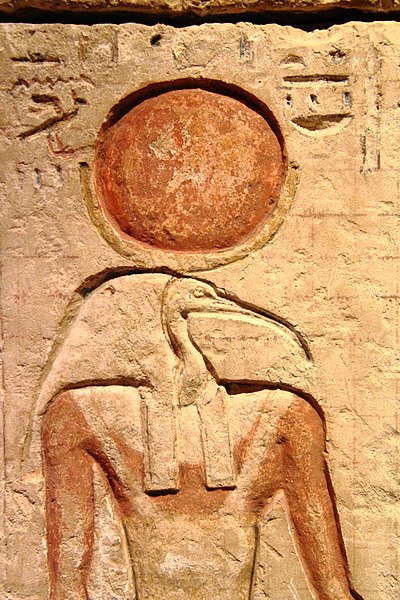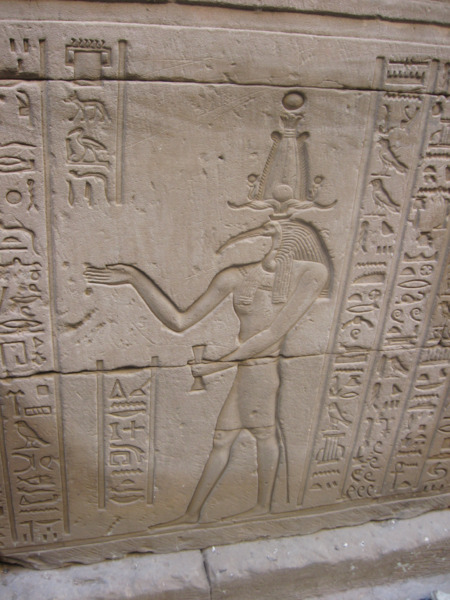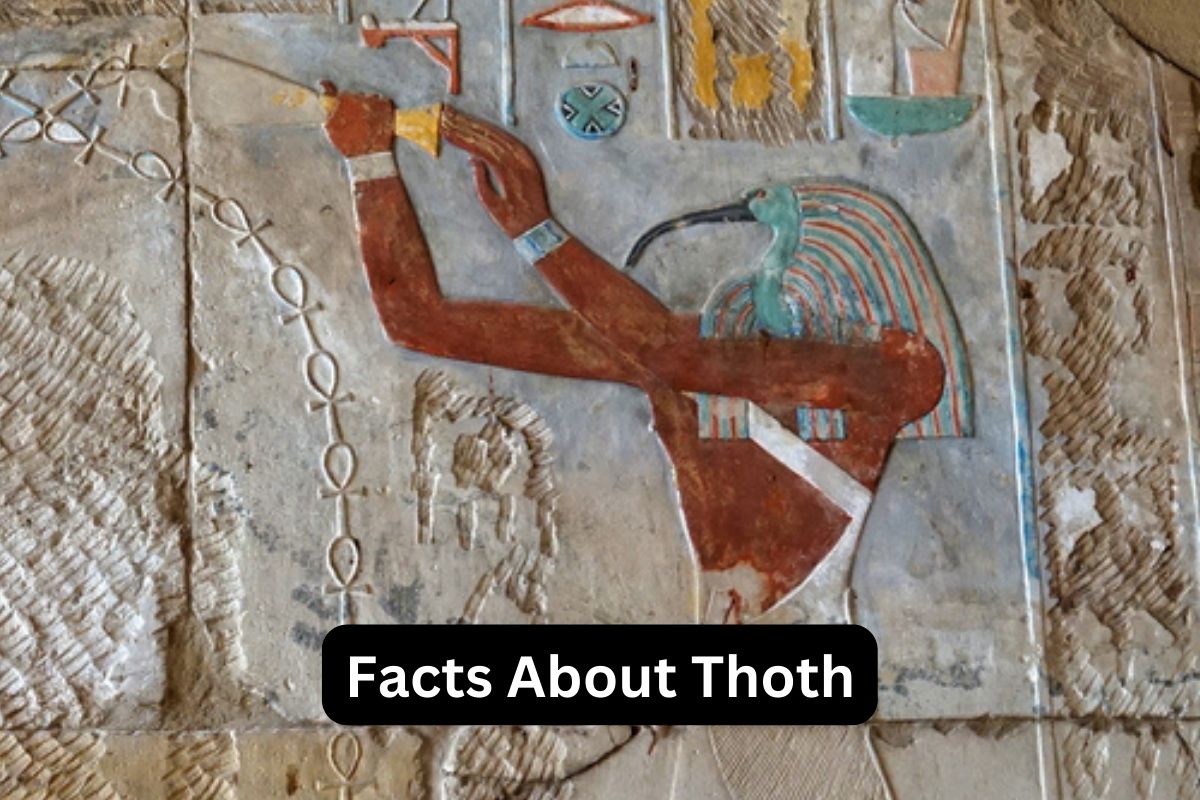Thoth, an ancient Egyptian god, holds a prominent place in Egyptian mythology and religion. Revered as the god of wisdom, writing, and the moon, Thoth played diverse and essential roles in Egyptian culture.
Depicted as a man with the head of an ibis bird or baboon, Thoth was associated with intellectual pursuits, magical knowledge, and the regulation of time. As the inventor of writing, he was considered the patron deity of scribes and scholars.
His influence extended to matters of justice and the afterlife, where he acted as a mediator and judge. Worshiped throughout ancient Egypt, his cult had significant centers in cities like Hermopolis Magna.
Thoth’s enduring legacy transcended Egypt, as he was identified with the Greek god Hermes and the Roman god Mercury.
Thoth Facts
1. Thoth is an ancient Egyptian god associated with wisdom, writing, and the moon
He was depicted as a man with the head of an ibis bird or sometimes as a baboon. Thoth was one of the prominent deities in the Egyptian pantheon, and his name in hieroglyphics is commonly represented as the ibis bird.
The ibis was chosen to symbolize Thoth because of its long beak, which resembled a reed pen used for writing. Sometimes, Thoth was also depicted with the head of a baboon, which was associated with his connection to wisdom and lunar cycles.

2. Thoth played a crucial role in Egyptian mythology as the god of writing, knowledge, and scribes
He was believed to have invented writing and was regarded as the patron deity of scribes, scholars, and magicians.
Thoth’s association with writing and knowledge stemmed from the ancient Egyptians’ belief that he invented hieroglyphic script, the writing system used in ancient Egypt.
As the god of writing, he was seen as the patron and protector of scribes, who were responsible for recording information, maintaining administrative records, and preserving religious and historical texts.
Thoth was also revered as the source of divine wisdom and was sought after by those seeking knowledge, particularly in the realms of magic and occult practices.
3. Thoth was also known as the measurer of time and the recorder of events
He was often depicted with a writing palette and stylus, emphasizing his role as the keeper of records and chronicler of history.
In addition to his association with writing and wisdom, Thoth was closely linked to the measurement and recording of time. He was believed to govern the lunar cycles and was associated with the concept of timekeeping.
Thoth’s role as the recorder of events is evident in his depiction with a writing palette and stylus, emphasizing his responsibility for recording significant historical events, religious rituals, and the actions of the gods.
This aspect of Thoth’s character ties into his role as the judge of souls in the afterlife, where he would consult the records to determine the fate of the deceased based on their deeds in life.
4. In addition to his association with writing and knowledge, Thoth was considered a mediator and arbitrator in disputes among the gods
Thoth’s role as a mediator and arbitrator made him an essential figure in Egyptian mythology. He was often called upon to resolve conflicts and disputes among the gods. His impartiality and wisdom made him a trusted advisor and judge.
He played a vital role in the judgment of the souls in the afterlife, weighing the hearts of the deceased against the feather of Ma’at, the goddess of truth and justice.
In the afterlife, Thoth played a crucial role in the judgment of souls. According to Egyptian beliefs, the heart of the deceased was weighed against the feather of Ma’at, symbolizing truth and justice. Thoth ensured that the judgment process was fair and balanced, allowing the righteous to enter the blissful afterlife and condemning the wicked to punishment.

5. Thoth was closely connected with the moon and was considered a lunar deity
He was believed to regulate the cycles of the moon and was associated with its phases.
Thoth’s association with the moon was significant in Egyptian mythology. He was believed to have a close relationship with the lunar cycles and was responsible for regulating its phases. Thoth was associated with the waxing and waning of the moon, which held symbolic meaning in the Egyptian belief system.
The moon’s cycles were often associated with fertility, growth, and the passage of time. Thoth’s lunar connection further reinforced his role as a deity who governed time, magic, and the cycles of life.
6. As the god of wisdom, Thoth was often depicted as an advisor to the other gods, including the chief god Ra
He was also associated with the concept of divine intelligence and was believed to possess great magical and occult knowledge.
Thoth was revered as the epitome of wisdom in Egyptian mythology. He was often depicted in the company of other gods, offering counsel and guidance. Thoth’s wisdom was sought after by both gods and humans alike.
He was believed to possess immense knowledge in various fields, including magic, medicine, and the mysteries of the universe. Thoth’s association with divine intelligence and occult knowledge made him a central figure in Egyptian magical traditions. He was considered the master of magical arts and was believed to have provided the knowledge and spells necessary for rituals and incantations.
Thoth’s connection to wisdom and magic made him an influential deity in ancient Egyptian society. His teachings and guidance were highly valued, and he was often invoked in intellectual pursuits, writing endeavors, and magical practices.
7. Thoth was associated with various symbols and objects
Thoth was associated with various symbols and objects, including the ibis bird, the baboon, the moon disk, the papyrus scroll, the scales of justice, and the ankh, which is an ancient Egyptian symbol of life.
Thoth’s association with the ibis bird and the baboon was a significant aspect of his iconography. The ibis bird, with its distinctive curved beak, was considered sacred to Thoth and represented his role as the god of writing and wisdom. The baboon, on the other hand, was associated with Thoth’s connection to lunar cycles and was seen as a symbol of intelligence and mystery.
Thoth was often depicted holding a moon disk, emphasizing his lunar attributes and his role as a regulator of time. The moon disk represented the moon’s phases and cycles, which Thoth was believed to govern.
The papyrus scroll was another symbol associated with Thoth. It represented writing, knowledge, and the preservation of information. Thoth was believed to have given the gift of writing and was the patron of scribes, making the papyrus scroll a fitting symbol for his association with these domains.
The scales of justice were also closely linked to Thoth. As the recorder and judge of the afterlife, he played a key role in the weighing of the heart against the feather of Ma’at. The scales represented the balance and fairness with which Thoth conducted his judgments, ensuring that justice was served.
Finally, the ankh, an ancient Egyptian symbol resembling a cross with a loop at the top, was often associated with Thoth. The ankh symbolized life and immortality, and Thoth’s association with it emphasized his role in matters of life, death, and the afterlife.
8. Thoth was often invoked by ancient Egyptians for help in matters of intellect, writing, and magic
Many ancient Egyptian scholars and scribes considered themselves followers of Thoth and sought his guidance in their pursuits of knowledge.
Thoth was highly revered by ancient Egyptians as the embodiment of wisdom and intellectual pursuits. Scholars, scribes, and students sought his guidance and assistance in their quest for knowledge.
Ancient Egyptian temples often housed libraries and centers of learning dedicated to Thoth, where scribes would engage in scholarly activities and study various disciplines.
Thoth was believed to inspire creativity, provide insights, and grant magical powers to those who invoked him. His influence extended to fields such as medicine, astronomy, and astrology, making him a patron deity for various scholarly and magical endeavors.
9. Thoth was linked to the creation myth in Egyptian mythology
According to some accounts, he was said to have played a role in the creation of the world and helped the sun god Ra navigate through the underworld during his nightly journey.
In certain Egyptian creation myths, Thoth was attributed with a role in the formation of the world. He was believed to have emerged from the primordial waters and played a part in separating the earth from the sky.
Thoth was also associated with the sun god Ra and was said to assist him in his nightly journey through the underworld. He would guide and protect Ra, ensuring his safe passage and subsequent rebirth at dawn.
10. Thoth was worshiped throughout ancient Egypt, and his cult had several important centers of worship
Thoth was worshiped throughout ancient Egypt, and his cult had several important centers of worship, including the cities of Hermopolis Magna and Khmun (known as Hermopolis Parva in Greek).
His popularity extended beyond Egypt, as he was also revered by neighboring civilizations, such as the Greeks and the Romans, who identified him with their god Hermes and Mercury, respectively.
Thoth’s worship was widespread in ancient Egypt, with numerous temples dedicated to him across the land. One of the most significant centers of worship was Hermopolis Magna, located in Middle Egypt.
